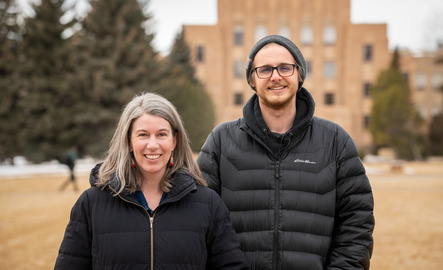About the Ethics Program
The ethics minor is a wonderful companion to any UW undergraduate degree, as it prepares
students to make responsible, thoughtful decisions in a variety of settings. As part
of the program, you’ll take at least 18 credit hours of courses. The ethics minor
curriculum is highly customizable in order to allow students to choose the courses
that apply to their interests and desired career path. All students take theory and
application courses and then choose advanced electives. Students also complete a capstone
project under the guidance of a faculty member.
Anyone pursuing an undergraduate degree from the University of Wyoming may enroll
in the ethics minor. There are no restrictions based on major.

UW’s Philosophy Department is home to many accomplished faculty members. The ethics minor is no exception! Learn more about the professors you’ll
meet within the program.
- Dr. Rob Colter: Dr. Colter’s research focuses on ancient Greek philosophy, particularly on the ethical and political ideas of philosophers like Socrates and Plato.
- Dr. Kristin Tennyson: Dr. Tennyson is known for her work in environmental ethics. She examines ethical issues related to environmental conservation, sustainability and natural resources.
- Dr. Jeff Lockwood: Dr. Lockwood focuses on bioethics and philosophy of science. He investigates the intersection of ethics and scientific practice, exploring how ethical standards apply to emerging scientific fields and technologies.

What can you do with an ethics minor?
An ethics degree easily applies to a wide variety of career pursuits. You’re likely to face ethical challenges or need to answer ethical questions, regardless of your industry or role. Most industries are placing more and more importance on professional ethics, so this minor will help you showcase that you’re prepared to work in a thoughtful and responsible manner.
The door is open to a wide range of jobs, including:
- Nonprofit program coordinator
- Ethics and sustainability advisor
- Legal assistant or paralegal
- Philosophy or ethics educator
- Human rights advocate
- Policy analyst
- Healthcare ethics consultant
- And many more!
With an ethics degree, you can pursue careers that require strong critical thinking, decision-making and a deep understanding of moral and societal issues. Graduates often work in fields like:
- Law and public policy
- Healthcare ethics and bioethics
- Business ethics and corporate compliance
- Nonprofit and advocacy organizations
- Education and academia
- Religious and spiritual leadership
- Technology ethics and AI policy
Yes, an ethics degree is excellent preparation for graduate school. It builds strong skills in critical thinking, logical reasoning, writing and ethical analysis—all of which are essential for success in fields like law, philosophy, public policy, theology and healthcare. Whether you're aiming for a JD, MA, MPA or another advanced degree, an ethics background shows that you can thoughtfully navigate complex issues and make well-reasoned arguments.
If you're considering an ethics minor and thinking about becoming an ethicist, you'll likely start with a bachelor's degree philosophy or a related field, then pursue a graduate degree. From there, you can specialize in areas like healthcare, business or technology ethics, gaining experience through internships, research or advisory roles. Many ethicists work in education, healthcare, policy or consulting, helping organizations navigate complex moral decisions.


